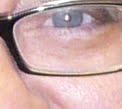She really could touch the tip of her nose with the tip of her tongue, and she could make the perfect cow face by rolling her eyes up and over to one side while letting her tongue wag to the other.
Babette suffered a lot and joked a lot and often put these together in pithy descriptions like, "Amanda, I'm just a butterfly in a rainstorm." I could see it perfectly, and I knew exactly what she meant somehow though I was a young child when she said it the first time. Always metaphors, never similes.
She was born in November of 1909, the late age child of her parents who already had a ten year old son, whose name I think was Burt. Her mother was not pretty, a kind of ship's masthead of a woman with broad shoulders and a don't-cross-me look on her face. Her father, however, was a pretty man with a bright smile that looked somehow starved in the faded old photos. Henry had curly hair, parted in the middle and light eyes.
Pictures of her childhood show she was clearly the apple of everyone's eyes with Mary Pickford hair curls and fancy dresses and coats, but tragedy struck her young and kept on striking for much of her life. Her father died when she was a child, maybe six years old, suddenly. Her brother, sixteen, gave his mother trouble by repeating his senior year in high school something like four times in order to stay on the football team. Tilly, Babette's mother, then kept afloat somehow on perhaps a pension. She raised chickens in the backyard in what would have been the eastern hinterlands of Denver, Colorado, beyond the end of the streetcar line.
Soon it was just mother and daughter when the brother disappeared never to be seen again by his sister, Babette, though she looked him up in every telephone book she ever saw. Babette was shy by now, and didn't like to make waves. She won best attendance in her Sunday school, and probably was learning some bit of Hebrew for her Bat Mitzvah when her mother caught the flu. It was 1922, and Babette was 13 years old. Her mother died and she had to go and live with her cousins.
What she remembered about her cousins was that they were pretty snotty but not very pretty. She often mentioned that one of them wore "pinchnese" glasses and she would wrinkle her nose to imitate this poor girl trying to keep her glasses on. Her uncle's only sign of affection was giving Babette the paper ring off of his cigars. They didn't tell her that she had money of her own, and she spent the rest of her growing up years believing she was a charity case, exacerbating her shyness.
Somewhere in childhood, perhaps, from the start at their local congregation, Babette met Robert who would later become her husband. Where she was shy, he was outgoing and rakish. He had athletic prowess, and seemingly endless creativity and ability to learn new things. She became a librarian after graduating from high school and attending a few semesters of college in Boulder.
They waited to get married until 1934, the year Prohibition was lifted. The Depression prevented Robert from getting work, and Babette felt she had to keep her librarian position. In those days they didn't allow married women to work. Her lifelong love of books and knowledge must have taken root in those years. It seems as if perhaps Robert's mother didn't approve of their union either because as soon as she died, they got married.
Their wedding was December 31, 1934. She wore an olive green cocktail dress with an orange collar and said she looked like a martini olive. This was fitting because they loved martinis and received nothing but liquor decanters and highballs and double old-fashion and champagne glasses for gifts. The judge told them that he was very grateful to be marrying them because he'd been marrying drunks all day, and he could tell that they really loved each other and would stick to their vows as couples should.
The first thing that happened was that Babette discovered she had a small fortune that she inherited upon marrying, and a house full of old-fashioned leather furniture from Robert's mother, who it seems to me more and more didn't approve of her. So, of course, she gave all the furniture away and bought ultra modern furniture for the big old house west of City Park. Robert's older brother, Earl, had no place to go and so he lived with them for many years.
Two years later Babette had her first son, Robert, then two years later a second son, Tom, and two years beyond that her daughter, Babette, fondly called Betsy. It was the end of the Depression, and the beginning of America's involvement with the war by the time Betsy was born. Her husband Robert was a full-fledged architect by then and things seemed to fall together pretty well for a long time.
More to come...

No comments:
Post a Comment